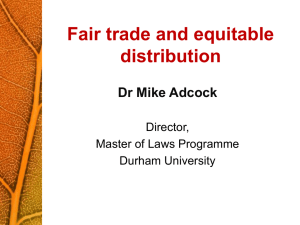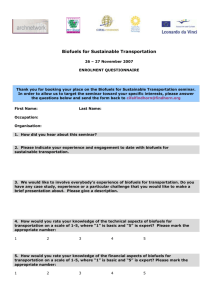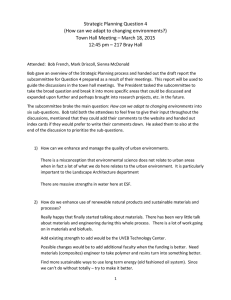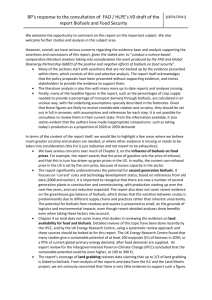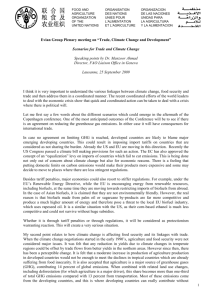“Trends in Global Biofuels Markets: Sustainability Policy and Trade”
advertisement
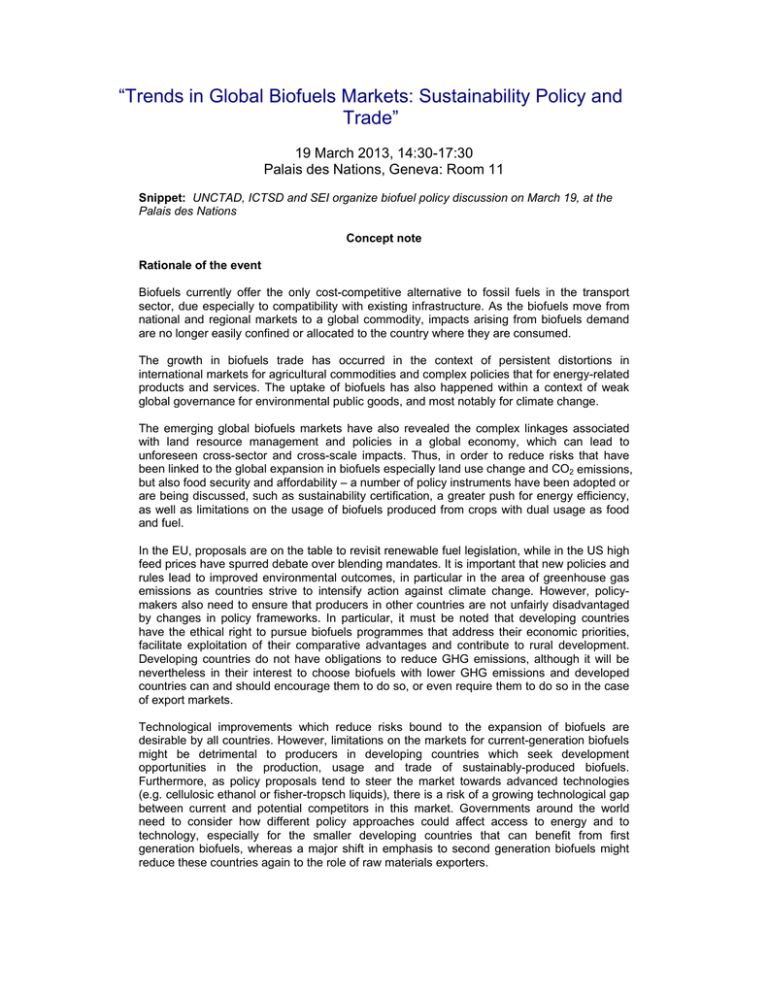
“Trends in Global Biofuels Markets: Sustainability Policy and Trade” 19 March 2013, 14:30-17:30 Palais des Nations, Geneva: Room 11 Snippet: UNCTAD, ICTSD and SEI organize biofuel policy discussion on March 19, at the Palais des Nations Concept note Rationale of the event Biofuels currently offer the only cost-competitive alternative to fossil fuels in the transport sector, due especially to compatibility with existing infrastructure. As the biofuels move from national and regional markets to a global commodity, impacts arising from biofuels demand are no longer easily confined or allocated to the country where they are consumed. The growth in biofuels trade has occurred in the context of persistent distortions in international markets for agricultural commodities and complex policies that for energy-related products and services. The uptake of biofuels has also happened within a context of weak global governance for environmental public goods, and most notably for climate change. The emerging global biofuels markets have also revealed the complex linkages associated with land resource management and policies in a global economy, which can lead to unforeseen cross-sector and cross-scale impacts. Thus, in order to reduce risks that have been linked to the global expansion in biofuels especially land use change and CO2 emissions, but also food security and affordability – a number of policy instruments have been adopted or are being discussed, such as sustainability certification, a greater push for energy efficiency, as well as limitations on the usage of biofuels produced from crops with dual usage as food and fuel. In the EU, proposals are on the table to revisit renewable fuel legislation, while in the US high feed prices have spurred debate over blending mandates. It is important that new policies and rules lead to improved environmental outcomes, in particular in the area of greenhouse gas emissions as countries strive to intensify action against climate change. However, policymakers also need to ensure that producers in other countries are not unfairly disadvantaged by changes in policy frameworks. In particular, it must be noted that developing countries have the ethical right to pursue biofuels programmes that address their economic priorities, facilitate exploitation of their comparative advantages and contribute to rural development. Developing countries do not have obligations to reduce GHG emissions, although it will be nevertheless in their interest to choose biofuels with lower GHG emissions and developed countries can and should encourage them to do so, or even require them to do so in the case of export markets. Technological improvements which reduce risks bound to the expansion of biofuels are desirable by all countries. However, limitations on the markets for current-generation biofuels might be detrimental to producers in developing countries which seek development opportunities in the production, usage and trade of sustainably-produced biofuels. Furthermore, as policy proposals tend to steer the market towards advanced technologies (e.g. cellulosic ethanol or fisher-tropsch liquids), there is a risk of a growing technological gap between current and potential competitors in this market. Governments around the world need to consider how different policy approaches could affect access to energy and to technology, especially for the smaller developing countries that can benefit from first generation biofuels, whereas a major shift in emphasis to second generation biofuels might reduce these countries again to the role of raw materials exporters. Jointly organized by ICTSD, UNCTAD and SEI, this event aims to bring together experts, countries and other interested parties to discuss recent developments in global biofuels markets, especially those concerning sustainability and trade. The event shall also discuss the proposed changes in the EU policy for the sector, which plans to limit the participation of biofuels produced from food crops to a maximum of 5% of the initial goal of 10% renewable energy in European transport by 2020. Some food crops, particularly the oil-based crops, are estimated to increase GHG emissions through indirect land use change. Expected outcomes UNCTAD, ICTSD and SEI have collaborated to organize this meeting in a bid to improve policy coherence in this particularly complex field, and to bring together the separate discussions taking place both in national capitals and in various parts of the international governance architecture. The meeting seeks to bring different perspectives on recent development trends in biofuels markets, including those of countries with established biofuel industries, as well as prospective producers and consumers in developed, developing and least developed countries. In special, the event seeks to raise constructive views and proposals on how to reconcile biofuels expansion with food security, and environmental sustainability objectives, while at the same time allowing for technological progress to take place in a manner that does not exclude developing countries from this growing market. ***

